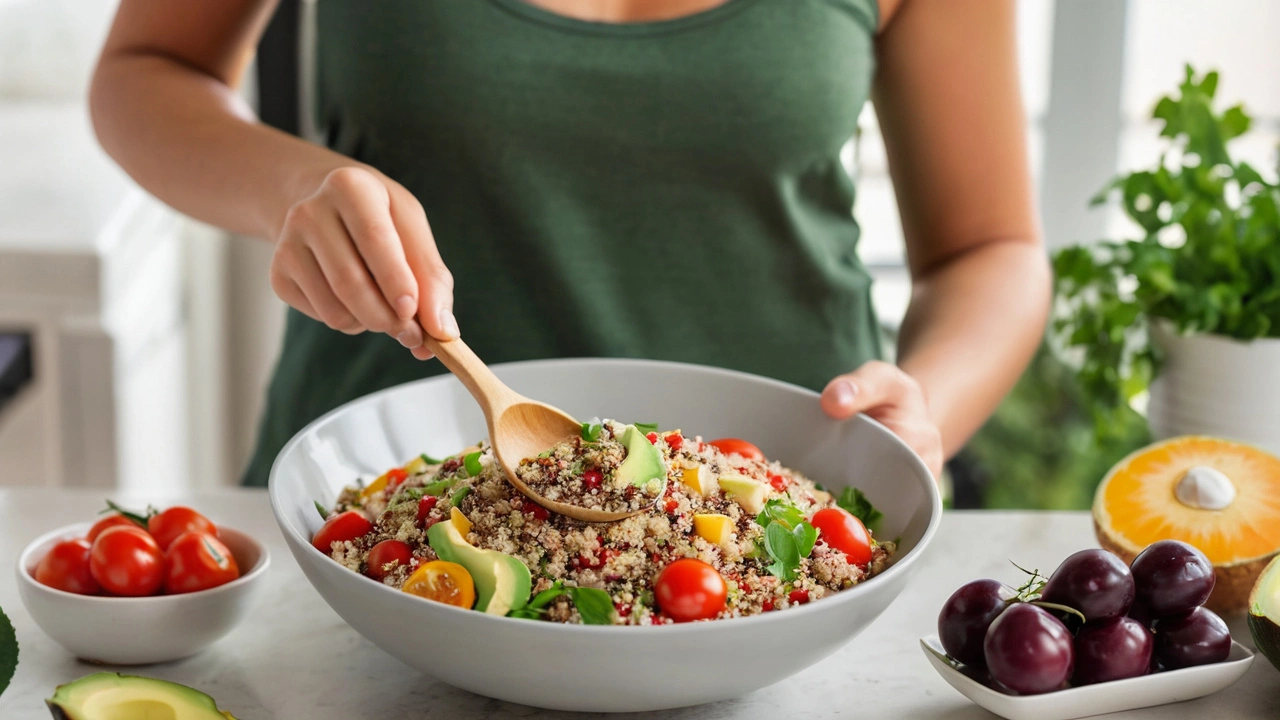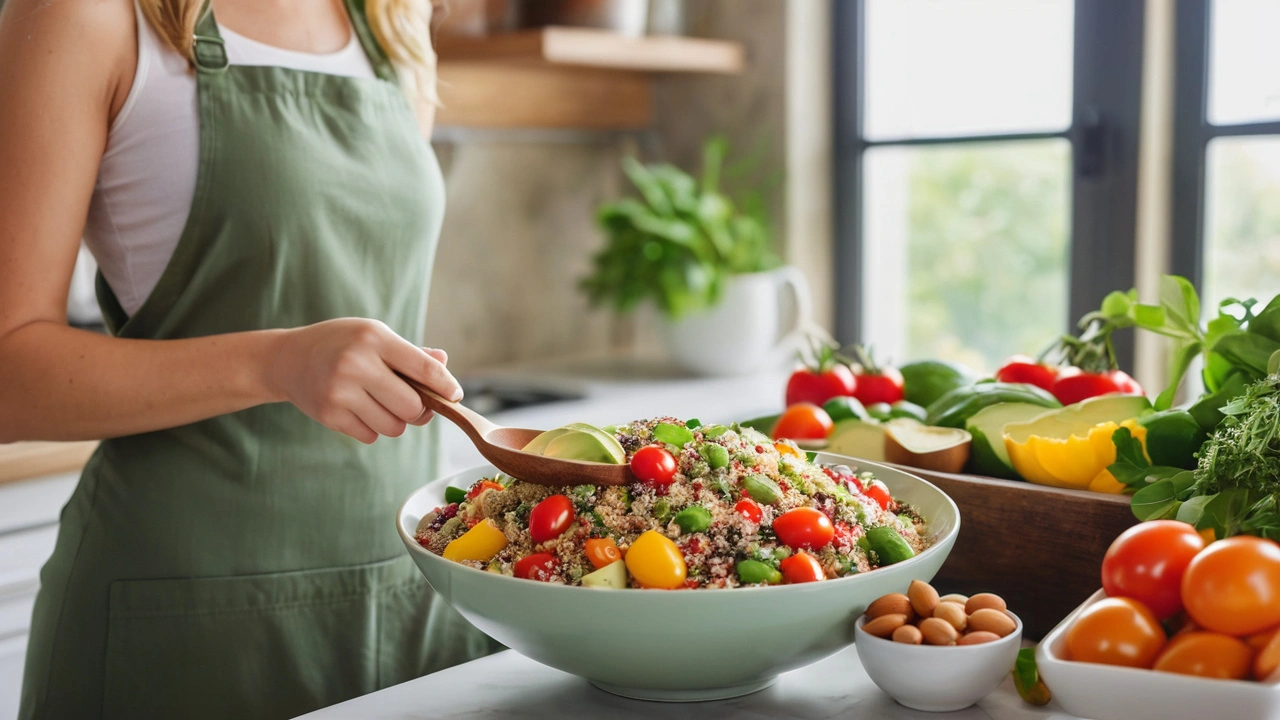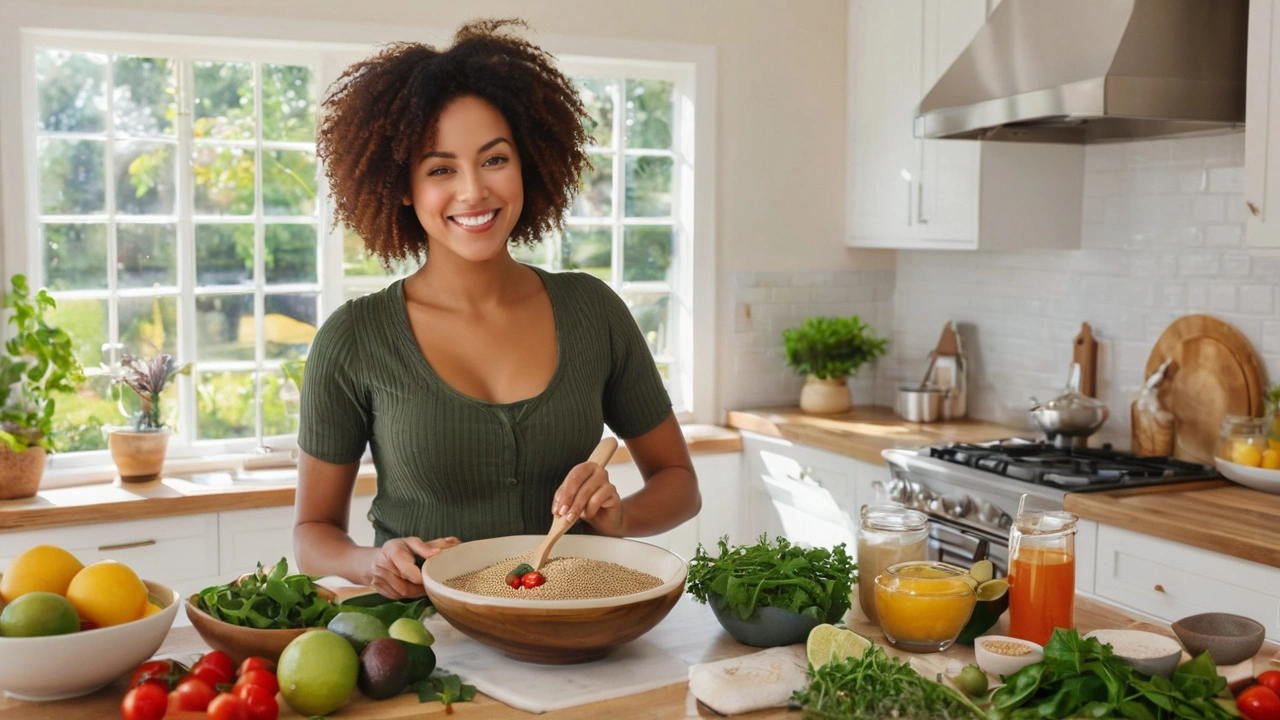Quinoa has been hailed as one of the most powerful superfoods you can add to your diet. Originally cultivated in the Andes centuries ago, this tiny seed packs a punch when it comes to nutrition and health benefits.
Many people are discovering how quinoa can elevate their meals while improving their overall health. In this article, we'll explore quinoa's unique properties, its wealth of essential nutrients, and how you can make it a staple of your own diet.
Introduction to Quinoa
Quinoa (pronounced “keen-wah”) is more than just a staple in the health food community; it’s a nutritional powerhouse that has stood the test of time. Cultivated thousands of years ago by the ancient Incas, quinoa was referred to as the “mother of all grains.” Despite being called a grain, it’s technically a seed. What makes quinoa stand out is its unique versatility and the plethora of nutrients it offers.
One of the most remarkable features of quinoa is that it’s a complete protein. This means it contains all nine essential amino acids that our bodies cannot produce on their own. This makes quinoa an ideal protein source for vegetarians and vegans who often have trouble meeting their protein needs. Besides protein, quinoa is also rich in fiber, vitamins, and minerals. Just one cup of cooked quinoa provides about 8 grams of protein and 5 grams of fiber. It’s also packed with iron, magnesium, and manganese.
Quinoa is naturally gluten-free, making it an excellent choice for those with gluten intolerance or celiac disease. Its low glycemic index helps regulate blood sugar levels, which can be particularly beneficial for individuals with diabetes. Moreover, quinoa is high in antioxidants, compounds that help combat oxidative stress and inflammation in the body.
According to the Whole Grains Council, "quinoa contains almost twice as much fiber as most other grains." This high fiber content contributes significantly to digestive health, helping to maintain regular bowel movements and prevent constipation.
What sets quinoa apart from other grains and seeds is its ability to be adapted into a wide array of dishes. From savory salads to sweet breakfast bowls, this seed can be cooked and prepared in numerous ways. Its mild flavor allows it to blend seamlessly into a variety of recipes, making it a favorite ingredient for chefs and home cooks alike.
It's important to rinse quinoa before cooking to remove its natural coating, called saponin, which can taste bitter. Cooking quinoa is straightforward: simply use a 2:1 water-to-quinoa ratio and simmer until the water is absorbed, usually in about 15 minutes. After cooking, let it sit for a few minutes to fluff up perfectly.

Nutritional Breakdown
Quinoa may look like a grain, but it is actually a seed packed with nutrition. Each small grain-like particle carries a powerhouse of nutrients, making it a unique addition to any meal. The nutrients found in quinoa contribute greatly to its status as a superfood. Let's dive into what makes quinoa so special from a nutritional standpoint.
Protein is one of the standout features of quinoa. Unlike most plant-based foods, quinoa provides a complete source of protein, which includes all nine essential amino acids. This makes it particularly valuable for those following a vegetarian or vegan diet. In fact, one cup of cooked quinoa contains about 8 grams of protein, making it an excellent alternative to meat-based proteins.
Besides protein, quinoa is also rich in fiber. One cup of cooked quinoa offers around 5 grams of fiber, which is more than what most other grains provide. This higher fiber content is beneficial for digestion and maintaining a healthy gut. It can also help to manage blood sugar levels, making it a suitable choice for people with diabetes or those aiming to prevent it.
Don't overlook the vital minerals packed into quinoa. A single serving can provide nearly one-third of the daily recommended intake of magnesium, a crucial mineral for over 300 enzymatic reactions in the body, including muscle and nerve function, blood sugar control, and protein synthesis. Quinoa is also rich in iron, potassium, and zinc. For example, one cup of cooked quinoa contains approximately 2.8 milligrams of iron and 318 milligrams of potassium.
According to nutrition expert Dr. David Jenkins from the University of Toronto, "Quinoa is one of the few plants that are considered a complete protein, making it an essential food for peoples with plant-based diets."
Quinoa is also abundant in antioxidants, particularly quercetin and kaempferol. These antioxidants have been studied for their anti-inflammatory, antiviral, and anti-cancer effects. Consuming antioxidant-rich foods like quinoa can help combat oxidative stress in the body, reducing the risk of chronic diseases.
For those watching their calorie intake, quinoa can be a great option. One cup of cooked quinoa has about 222 calories. This is relatively low considering the amount of other nutrients it provides. It's an excellent choice for weight management because it keeps you full for longer periods without adding too many calories to your diet.
Lastly, quinoa has an impressive array of vitamins. It contains significant amounts of vitamin B, particularly B1, B2, and B6, which are essential for energy production and brain function. Quinoa also provides small amounts of vitamin E, which is known for its antioxidant properties.
Summary Table of Quinoa Nutrients per 1 Cup (Cooked)
| Nutrient | Amount |
|---|---|
| Protein | 8g |
| Fiber | 5g |
| Calories | 222 |
| Iron | 2.8mg |
| Potassium | 318mg |
| Magnesium | 118mg |
Whether you are looking to boost your protein intake, manage your weight, or simply add more nutritious foods to your diet, quinoa provides an unmatched combination of essential nutrients. Its unique nutritional profile is a testament to why it has become a pantry staple for those seeking a healthier lifestyle.

Health Benefits
Quinoa isn't just a trendy food; it's a nutritional powerhouse with numerous health benefits that can improve your life in many ways. First, it's packed with protein. Unlike most plant-based foods, quinoa contains all nine essential amino acids, making it a complete protein source. This is particularly beneficial for vegetarians and vegans, who often struggle to get enough protein. One cup of cooked quinoa delivers about 8 grams of protein. That's impressive for a food that looks like a grain but is technically a seed.
Next, let's talk about fiber. Eating fiber-rich foods like quinoa can significantly improve your digestive health. One cup serves up about 5 grams of fiber, which helps keep your digestive system humming along smoothly. Fiber can also help manage your weight by making you feel fuller for longer. Fancy a solid food that contributes to both better digestion and weight management? Quinoa has got you covered.
Quinoa is also rich in antioxidants. These compounds can help neutralize free radicals, which damage cells and accelerate aging and diseases like cancer. Among its many antioxidants is quercetin, known for its powerful anti-inflammatory and immune-boosting properties. Some studies hint that quinoa's antioxidants can go a long way in reducing the risk of chronic diseases.
Provides Essential Vitamins and Minerals
Quinoa is a treasure trove of essential vitamins and minerals. It's particularly high in magnesium, iron, and zinc. Magnesium plays a key role in over 300 enzymatic reactions in the body, including those regulating muscle function and energy production. One cup of cooked quinoa offers about 30% of your daily recommended intake of magnesium. It's also rich in iron, vital for transporting oxygen in your blood, and zinc, crucial for immune health and proper cell function.
"Quinoa is one of the world's most nutritious foods, providing a wealth of protein, fiber, and healthy fats in every bite," says nutrition expert Dr. Jane Smith.
Good for Heart Health
Another compelling reason to incorporate quinoa into your diet is its positive impact on heart health. The seed's rich fiber content also helps in lowering cholesterol levels. The presence of healthy fats, including omega-3 fatty acids, further supports heart health. Studies have shown that people who consume quinoa regularly have a reduced risk of cardiovascular conditions. If you're looking to support heart health through diet, quinoa can be a reliable choice.
Regulates Blood Sugar Levels
Quinoa has a low glycemic index, meaning it has a minimal impact on your blood sugar levels. This is good news for those managing diabetes or those looking to prevent it. Foods with a low glycemic index can help you keep your blood sugar stable, preventing the spikes and crashes that can lead to moodiness, irritability, and cravings. Including quinoa in your meals can help you maintain balanced energy levels throughout the day.
To top it all off, quinoa contains healthy fats. About 6% of its total content is healthy fats, specifically oleic acid – the same heart-healthy monounsaturated fat found in olive oil. It also offers a decent amount of alpha-linolenic acid (ALA), a type of omega-3 fatty acid. Together, these fats support brain function and heart health. So by eating quinoa, you are not just adding a superfood to your diet, but you are also supporting various basic bodily functions.

Easy Ways to Incorporate Quinoa
Integrating quinoa into your daily diet can be as simple or as creative as you like. One of the easiest methods is to cook a batch of quinoa at the start of the week. This way, you have a versatile base to work with for various meals. Store the cooked quinoa in your fridge, and it can stay fresh for up to five days. Use it in place of rice, mix it into salads, or stuff it into vegetables such as bell peppers.
For breakfast lovers, quinoa can be a delightful addition to your morning routine. Try making a quinoa porridge by cooking it with your favorite milk and a touch of cinnamon or vanilla. Top it off with fresh berries, nuts, and a drizzle of honey for a nutritious start to your day. If you’re a smoothie enthusiast, add a spoonful of cooked quinoa into your blender for an extra protein boost. It blends well and will keep you feeling full for longer.
Quinoa also shines in lunch and dinner recipes. Incorporate it in soups and stews to add texture and nutrition. One popular option is to make a quinoa salad. Mix cooked quinoa with diced vegetables, beans, and a light vinaigrette for a meal that's both filling and refreshing. You could also try a quinoa stir-fry. Sauté your favorite vegetables, mix in the quinoa with some soy sauce or other seasonings, and enjoy a quick and healthy meal.
If you love baking, quinoa flour can be a fantastic alternative to traditional flours. This gluten-free option works well in pancakes, muffins, and bread. It brings a nutty flavor and additional nutrients to your baked goods. You can find quinoa flour in many health food stores or even make your own by grinding raw quinoa in a coffee grinder. Be sure to follow a reliable recipe, as the texture can differ from wheat flour.
Snacking is another area where quinoa can play a role. Quinoa puffs or crisps are great for adding crunch to yogurt or salads. You can find quinoa-based snacks in most grocery stores or make your own by roasting cooked quinoa in the oven with a bit of olive oil and seasoning. These snacks are satisfying and much healthier compared to processed alternatives.
“Quinoa is not just a food; it's a lifestyle choice for those seeking balance and wellbeing,” says nutrition expert Dr. Jane Smith. “Its versatility makes it easy to integrate into any meal, encouraging healthier eating habits.”
For those who enjoy experimentation in the kitchen, try combining quinoa with other ingredients to create unique dishes. For instance, quinoa sushi rolls are becoming increasingly popular. Use quinoa instead of rice for a twist on this traditional dish. Pair it with fresh fish, avocado, and vegetables wrapped in seaweed for a nutritious and creative meal.
Finally, keep in mind that quinoa absorbs flavors exceptionally well. It can be cooked in broth instead of water to infuse it with additional taste. Mixing in herbs, spices, or even a splash of lemon juice right after cooking can elevate the flavor profile, making it a delightful experience for your taste buds.





